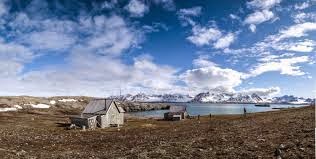 |
| GRAY Bridge over the Seine at Elbeuf. (Sources, 1, Curated by Michael Sabarly) |
Are you tired of picturesque Ocean Falls, British Columbia? I know I'm not. This is Kimsquit Lodge, the women's dorm.
 |
| City of Vancouver Archives |
Let us say it's 195-- Okay, I've already used "194Q," so, let's say, "195R." That is, this the year that the future begins, so you are never actually there. You've been in Ocean Falls, man and boy, since before 1924, and you're thinking about next year, or the year after that. The year things start to move in this hick town. (The only Simpsons clip this could possibly link.)
So you're not overly impeded by reality, is what I'm saying. You can see the future. The company brings in unattached women to do women's work. (You know: staff the cafeteria, type, clean up. Obviously you don't put the nurses and teachers and head secretaries here. Obviously.) They meet millwrights, they marry, they buy a home in Martin Valley. They get a car. By that time, the road is through. Their kids go through the class-enhancing magic of high school, and drive the 600km or so to Williams Lake, the 1200 or so to university to Vancouver. The 2500 or so to golden California and the kind of magical, middle-class jobs that people have been lighting out of the coast for since time immemorial --but now they can come back! No more people complaining about the isolation! Before you can turn around, there'll be one of those new-fangled "shopping malls" in town!
So what's a "Kimsquit?" A small town in B.C. This is what it looked like in 1913.
 |
| Source |
I don't want to make some German Indianer cosplayer squee himself to death or anything, but the burden of the picture is that Kimsquit was abandoned years ago. (Almost. James Sirois still lives there.) It's not the forest primeval. There's been some logging, and there's an air strip to accommodate fly in anglers.
If you can get away from that kind of thinking, you will notice that that's the Dean River issuing into the head of Dean Channel at 52 degrees 13 minutes North, and you will appreciate that this is nice farmland at the mouth of one of only three rivers that punch through the Coastal Range: the Fraser, the Skeena and the Dean. The first two host major seaports. (Prince Rupert has a container terminal now. That qualifies as "major," right?) So why not a third?
Because, we say now, in our diminished world where 195R never happened, because. It's just impossible. Not even worth bothering about. No-one's going to farm way out there, or build a railway connection. Or a town. We don't do that sort of thing any more. Better to leave the Dean River as a veritable Mecca of anglers, the place that makes every fly fisher's eye gleam at the mention, because of the superlative quality of the super-steelhead trout which inhabit this best of all possible rivers.*
Our booster/dreamer can be spared for not thinking that way, for naming the women's dorm "Kimsquit Lodge" as a step on the inevitable progress that leads to the moment (soon now!) when the road that links Ocean Falls to the world, the road that has to pass through Kimsquit anyway, climbs the Dean River valley to Anahim Lake.
From this distance, we can see the absurdity of this road that descends the Dean Canyon and climbs passes between four watersheds on its way from Kimsquit to Ocean Falls. Looked at from the other side, the fact that the road goes through four heavily forested watersheds is an advantage. All of that fibre, tied to Ocean Falls forever!
This will be 195R.
Perspective: here's work on Wong Chee's Corner, the turn around the bluff that takes Ocean Falls Road from the townsite to Martin Valley in 1924, per the Ocean Falls Museum.
Shovels and wheelbarrows. That's 1924.
Here's work on U.S. 10, the later I-90, in Snoqualmie Pass, Washington, in 1950, from the University of Washington Library's Flickr account.
We're not even building interstates yet, but a bit of a change in methods, don't you think? 195R is the year when roadbuilding gets this easy on the road to Ocean Falls. It's year that never comes, a year as imaginary as flying cars.
In the imagination of Walther Model, briefing his Fuehrer on the evening of 25th August, the question was one of managing the withdrawal of Army Group B behind the Somme-Marne line in the respite given by The Allied halt and regrouping on the Seine. The Somme line would not hold forever, but it would provide a place on which to reconstitute the battered remnants of his command. Walther Model does not believe in 195R. But he is still wrong.



.JPG)





